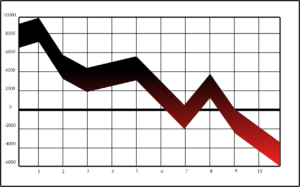By Richard Thomas

(Credit: Pixabay
No sooner was the craft distilling boom a clear phenomenon in the United States than certain pundits began to wonder aloud and in print “when is the craft spirits bust coming?” That line of thinking wasn’t necessarily hostile, seeing as how the boom and bust cycle of business is an axiom. It’s a fair question. Indeed, it seems the only folks in journalism and blogging who actually forget that every period of explosive growth must necessarily lead to over-expansion and a downturn work, ironically, for the business news.
But starting about five years ago, speculation on whether the craft distilling boom would slowly run out of steam or experience a sudden crash (as in the world whiskey crash of the 1970s), and either way when that would happen, became a staple of drinks writing. The storyline became a meme in the drinks writing community, regularly appearing in basic summaries of trends and as a feature topic in just about every magazine and website that covers drinks as a cultural subject. The most common trope of this genre was to draw parallels between the craft beer boom of the 1990s and the modern craft distilling boom, producing articles that were well-educated about craft beer history and shockingly ignorant of craft distilling.
The first suggestions these prophecies might be coming true was after 2017, with the Trump Trade War. Retaliatory tariffs levelled on whiskey hit any small distiller expanding into foreign markets especially hard. Even so, most small distillers were focused not even on a national market, but a largely regional or even local one. It was really with the pandemic that the boom looked poised to go bust; lockdowns were just weeks old when the first prediction that craft distilling was doomed appeared in print. Yet it wasn’t until late summer the struggles many craft distillers waged with the aftershocks of lockdown and continued restrictions had become clearer.
Yet it’s now the Summer of 2021, 16 months after most lockdowns began. Craft distilling has experienced two of the biggest shocks–the Trump Trade War and the pandemic–that anyone could imagine. These crises overlapped, covering some 3 1/2 years, but the effect they have had on small distillers is unclear, and far from the crash of mass closures that so many thought would attend the end of the line.
I reached out to both the American Distilling Institute and the American Craft Spirits Association regarding statistics on craft distiller closures; they are still collecting data, which means no hard facts are available as of yet. Really all anyone has to go on at present is anecdotal evidence, and that evidence suggests craft distilling is hurting for sure, but very far from crashing.
Leaving aside trade association people, I spend as much time communicating with small distillers in America and around the world as anyone. I literally wrote the book on the subject, and the fact is everyone I was talking to in 2019 is still with us in 2021, and that contact list covers hundreds of craft whiskey distillers. The long-predicted craft distilling crash did not happen, and if the sector can survive a trade war and a pandemic, it is not going to collapse under its own weight any time soon. Unlike 1990s craft beer, most of the people who have gotten into small distilling are very business savvy; unlike the 1970s whiskey crash, tastes and trends continue to favor spirits.
This is not to say the effects of the dual crises that struck small distillers in recent years has fully played out, not the least because the pandemic isn’t over. A distillery that is hurting today could very well limp along for a while, only to fail in the next year or two. But that particular scenario rings more like the beginning of craft distilling running out of steam than a crash, the start of a slowdown in the explosive growth and fast-rising sales and not their abject cratering. To describe that as a downturn is misleading; a better term would be maturity.
 The Whiskey Reviewer A World of Whiskey, Poured Every Weekday
The Whiskey Reviewer A World of Whiskey, Poured Every Weekday
